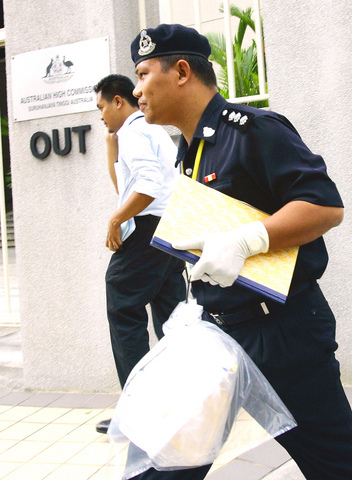At least 11 foreign embassies in the Malaysian capital have been sent suspicious packages containing threatening letters linked to the treatment of Muslims, police said yesterday.
The packages -- which also contained compact discs and an unidentified liquid -- were aimed at taking advantage of the security situation after the bomb attacks in Bali, Indonesia, police said.
Five missions -- the US, Russia, Britain, France and Australia -- received packages yesterday, bringing the number of missions hit by the scare to at least 11, Kuala Lumpur police chief Mustafa Abdullah said.

PHOTO: AP
"You have been infected with a biochemical weapon. Curse you for what you have done to the Muslim ummah," the note in each letter said, according to the police chief.
The word ummah refers to Islamic society.
Abdullah said police believed the letters were a hoax and the substances were harmless. He accused those responsible of playing on heightened fears created by the weekend attacks in Bali which left 19 dead.
The bombing has been blamed on the Southeast Asian Islamic militant group Jemaah Islamiyah (JI), which is accused of links to the Al-Qaeda network, and Indonesian police are hunting two Malaysian leaders of JI.
The Australian and British high commissions and the US and French embassies said suspicious packages had arrived yesterday morning.
Mustafa said the Russian embassy had also received a package.
"The packages contained a CD-ROM together with a greenish liquid, similar to water coolant. We have sent the contents for analysis," Mustafa said.
A French embassy official said their security officers had examined an express mail package, which contained a compact disc wrapped in yellow plastic and had a postmark from the city of Kota Baru in northern Kelantan state.
The police and the hazardous materials unit were called.
US embassy officials also confirmed receiving a "suspicious package" but they declined to give details. Japan, Germany, Thailand, Canada, the Philippines and Singapore all received parcels on Tuesday by express mail.
The Japanese embassy, the first to receive a package, was evacuated for several hours before police gave the all-clear.
Police have said the packages, delivered by express mail, appeared to originate from the central state of Selangor which surrounds Kuala Lumpur, as well as from Kelantan and northern Terengganu.
Diplomats said most packages contained a compact disc and liquid.
"It contained a broken CD and it was in a transparent envelope and surrounded by a small amount of liquid," said Chi van Haastrecht, second secretary at the Canadian High Commission.
The police chief for the main embassy district, Kamal Pasha Jamal, said security had been stepped up following the incidents.
"Security at the embassies has been beefed up, we have deployed more police officers to enhance patrols in the areas," he said.
Most diplomats were tight-lipped about security measures Wednesday, but the Canadian, Singapore, French, Japanese, Thai, Australian, Philippine and British missions said they were open for business.

Auschwitz survivor Eva Schloss, the stepsister of teenage diarist Anne Frank and a tireless educator about the horrors of the Holocaust, has died. She was 96. The Anne Frank Trust UK, of which Schloss was honorary president, said she died on Saturday in London, where she lived. Britain’s King Charles III said he was “privileged and proud” to have known Schloss, who cofounded the charitable trust to help young people challenge prejudice. “The horrors that she endured as a young woman are impossible to comprehend and yet she devoted the rest of her life to overcoming hatred and prejudice, promoting kindness, courage, understanding

US President Donald Trump on Friday said Washington was “locked and loaded” to respond if Iran killed protesters, prompting Tehran to warn that intervention would destabilize the region. Protesters and security forces on Thursday clashed in several Iranian cities, with six people reported killed, the first deaths since the unrest escalated. Shopkeepers in Tehran on Sunday last week went on strike over high prices and economic stagnation, actions that have since spread into a protest movement that has swept into other parts of the country. If Iran “violently kills peaceful protesters, which is their custom, the United States of America will come to

‘DISRESPECTFUL’: Katie Miller, the wife of Trump’s most influential adviser, drew ire by posting an image of Greenland in the colors of the US flag, captioning it ‘SOON’ US President Donald Trump on Sunday doubled down on his claim that Greenland should become part of the US, despite calls by the Danish prime minister to stop “threatening” the territory. Washington’s military intervention in Venezuela has reignited fears for Greenland, which Trump has repeatedly said he wants to annex, given its strategic location in the arctic. While aboard Air Force One en route to Washington, Trump reiterated the goal. “We need Greenland from the standpoint of national security, and Denmark is not going to be able to do it,” he said in response to a reporter’s question. “We’ll worry about Greenland in

PERILOUS JOURNEY: Over just a matter of days last month, about 1,600 Afghans who were at risk of perishing due to the cold weather were rescued in the mountains Habibullah set off from his home in western Afghanistan determined to find work in Iran, only for the 15-year-old to freeze to death while walking across the mountainous frontier. “He was forced to go, to bring food for the family,” his mother, Mah Jan, said at her mud home in Ghunjan village. “We have no food to eat, we have no clothes to wear. The house in which I live has no electricity, no water. I have no proper window, nothing to burn for heating,” she added, clutching a photograph of her son. Habibullah was one of at least 18 migrants who died